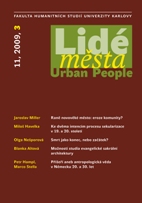Raně novověké město: eroze komunity?
The Early Modern City: An Eroding Community?
Author(s): Jaroslav MillerSubject(s): Cultural Essay, Political Essay, Societal Essay
Published by: Univerzita Karlova v Praze - Fakulta humanitních studií
Keywords: community; early modern period; transformation of urban societies
Summary/Abstract: Mostly based upon the critique of classical community/society theories as introduced and developed by Ferdinand Tönnies, Émile Durkheim, Georg Simmel, Karl Popper and/or the Chicago school of sociology, the article has the ambition to provide a theoretical model explaining the crisis of a tradition-oriented community and the emergence of the modern urban society in the period before 1800. As such, the study expands far beyond the limits of a classical historical science as it permeates into sociology, historical demography, cultural anthropology and/or the history of ideas. All main sociological approaches toward ideal types of community and society, namely the typology (F. Tönnies, G. Simmel, É. Durkheim, M. Weber, L. Wirth, R. Redfield, H. Becker), the ecology (The Chicago School), the conflict theory (K. Marx, J. Coleman, M. Castells) and the systems theory (R. L. Warren), tacitly concur that while pre-modern urban life was predominantly characterized by Gemeinschaft-like relationships (a strong identification with community, emotionalism, traditionalism, a high level of social control, etc.), the Gesellschaft-like relationships (individualism, formalized social control, rational bonds, etc.) are rather typical for the populations of modern cities. Since Ferdinand Tönnies, the concern for the transformation of Gemeinschaft into Gesellschaft has been one of the basic and continuing themes in community sociology. In a search for the all-embracing explanation of this qualitative change, sociologists have introduced a great variety of theories. Some, like Ferdinand Tönnies, Karl Marx and/or Émile Durkheim, associated the Vergesellschaftung with a revolutionary economic development while other scholars (Max Weber) referred to the transformation as the result of increasing “rationalization.” Alternatively, the first generation of American urban ecologists (Louis Wirth, Robert Redfield) reasoned that large population size producing a high degree of heterogeneity would necessarily result in the collapse of community and the rise of society. Notwithstanding a great number of rival theories, most urban sociologists have maintained that the modern Gesellschaft characteristics emerged as late as the 19 th century while the pre-modern city has been traditionally described in terms of Gemeinschaft. As such a view seems to be at odds with the available historical evidence, the article sets out to defend the thesis that European citizenry gradually lost most Gemeinschaft characteristics already between 1500 and 1800. In other words, it is suggested that some social relationships typical for modern society emerged in the early modern period and, consequently, they were not the products of the 19 th century industrialization and liberalism as traditionally believed by many scholars.
Journal: Lidé města
- Issue Year: 11/2009
- Issue No: 3
- Page Range: 419-439
- Page Count: 21
- Language: Czech

